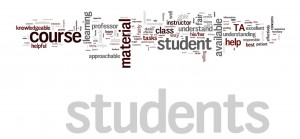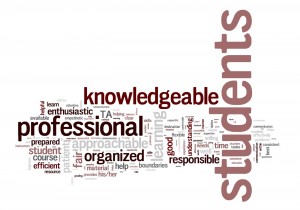This week has been a busy one, in a good way! Here are some highlights:
Accomplished a Goal: the Instructor’s Manual
On Monday I was relieved to finish the instructor’s manual to accompany my research methods textbook. Not every textbook has one, and from my own experiences I’ve noticed they vary in usefulness. The point of an instructor’s manual is to give instructors ideas for ways to engage their learners in the material. The prompts most often include demonstrations, in-class and out-of-class activities, discussion starters, and sometimes include assignments and references to other resources. It was fun to go back through my own lessons and add my teaching techniques, along with ideas for assignments and grading keys, course sequencing, and other tips. I hope instructors find it useful for engaging students in learning research methods!
Networking and Socializing Events
Members of our Instructor Network gathered on Tuesday afternoon for an informal meet-and-greet. In addition to reconnecting with colleagues I know well, it was fun to get to know some new (to me) teaching-focused people from across campus, including fellow long-distance runner and chair of Critical Studies in Sexuality Janice Stewart, and Computer Engineer Paul Davies. Also, I learned more about the Coordinated Arts Program from newly tenure-tracked Instructors Laurie McNeil and Kathryn Grafton. I had known about the program before, but hadn’t heard about the instructor’s perspective. It sounds like a creative opportunity to engage in collaborative teaching while thinking about the different perspectives one’s own and others’ disciplines offer on a particular topic. Sounds wonderful!
Friday morning was one of my favourite events of the entire year: Graduation! In addition to cheering on all of the psychology bachelor’s degree graduates, I had the pleasure of welcoming two friends to PhD status. It was wonderful catching up with each of them; I was honoured to be able to share in their achievements. Lara Aknin is heading across the city to Simon Fraser University to start an Assistant Professorship this fall, and Jen St. Onge has moved back to her hometown of Regina to work in making industry-research partnerships, including training industry folks in research methods. After the graduate ceremonies and coffee, the faculty who attended all went out for lunch with our Department Head, Alan Kingstone. I had a lovely informal afternoon catching up with colleagues/friends.
Saturday morning I had the pleasure of participating in the Alumni Weekend 15 Minute Degree. Along with some friendly colleagues from across campus, I met with alumni, their precocious children and friends, as well as some current UBC students, to chat informally about what’s new in psychology and teaching it. I enjoyed some delightful conversations including how I use clickers to engage my learners in the classrooms of 100-500 students, how memory works, theories of self-control, what makes modern psychology a science, and how to evaluate therapists when seeking help. And I have to add the weather was amazing!
Professional Development Activities
One of the many things I love about my career is the opportunity to collaborate with other people. This week, I met with the amazing Negin Mirriahi, the Manager of the Arts Learning Centre at Arts ISIT. We met to start analyzing our data from a scholarship of teaching and learning project we started last year. We’re exploring the relationships among students’ attitudes and beliefs about Team Based Learning (specifically the Readiness Assurance Process) and their team project and course grades. We still have a long way to go on that project, but we’re having fun getting there!
On Thursday I led a workshop for the Teaching Assistant Training Community of Practice (through CTLT). Our CoP is a group of people from way across campus (think physics, biology, psych, land and food, french/hispanic/italian studies, english, geography, math, statistics…) who meet monthly with the goal of improving the TA training we offer within our departments (funded by the Provost). Over the past two years we’ve really grown into a supportive community; it’s really a pleasure to make time for this group in my schedule. Anyway, it was my turn to lead a session, this time on cross-discipline/department Standards for TA training. This sounds like an impossible task, but over the course of an hour and a half we discovered that Eison and Vanderford (1993) is a really useful tool for reflecting (and helping each other reflect) on whether we are offering comprehensive programs. Of course, not every item is relevant for every department/discipline. Moreover, the way I address an item can look very different from the way someone else does. We considered the idea that perhaps rather than a common set of standard elements, what might be the best standard would be asking a common set of questions, and having thoughtful answers to them (whatever those may be). Rich discussions throughout!
Last but not least, I had the pleasure of meeting with one of the many graduate students on this campus who inspire me, Natasha Holmes from physics. I met her through the TA Training CoP (above), and she sat in on my Psyc 218 class last term to brush up on her small sample statistics for behavioural sciences (she’s conducting scholarship of teaching and learning for her PhD). Two exciting opportunities came from our meeting: (1) it looks like I’ll be offering a couple of workshops for the STLFs who are doing similar work, and (2) we may be collaborating in her new capacity, as co-director of the Let’s Talk Science program. In LTS, Graduate students go into elementary school classes to lead demonstrations of scientific phenomena. Psychology is science. Let’s get psychology (e.g., understanding of the brain, memory, social influence) into elementary schools! Just an idea at this point, but exciting!
Wow, that was a way longer entry than I expected it to be! Hope you’ve gathered some insights into what I’ve been up to, as an example of what some professors do in their off-season (i.e., often it’s lots!).

 Follow
Follow

